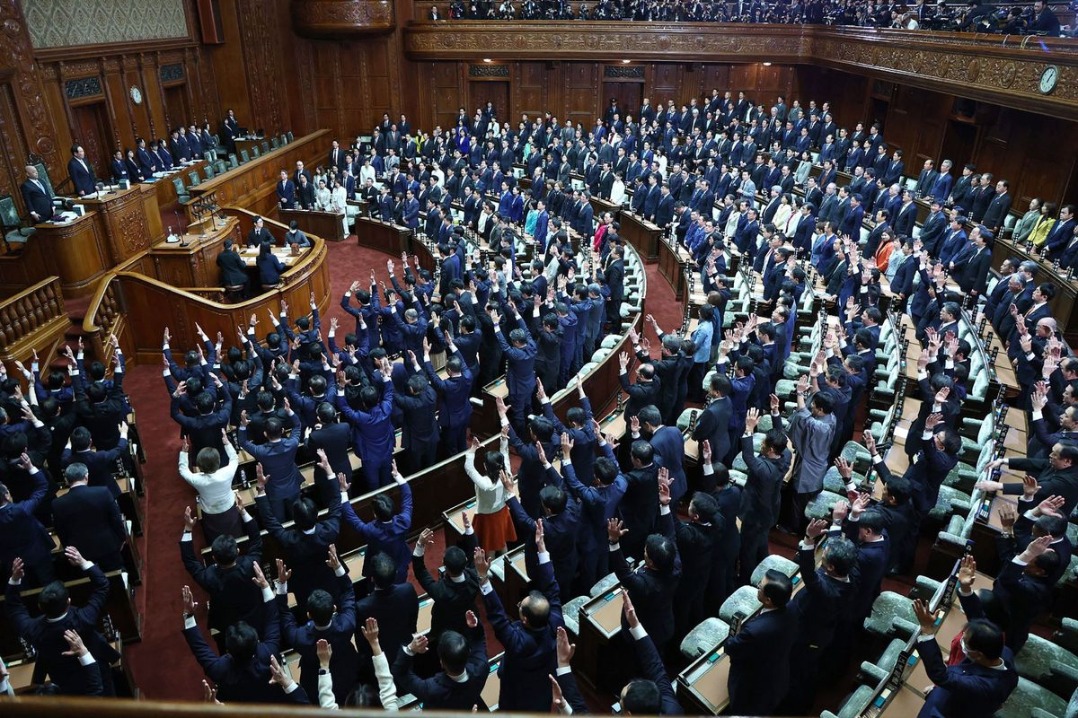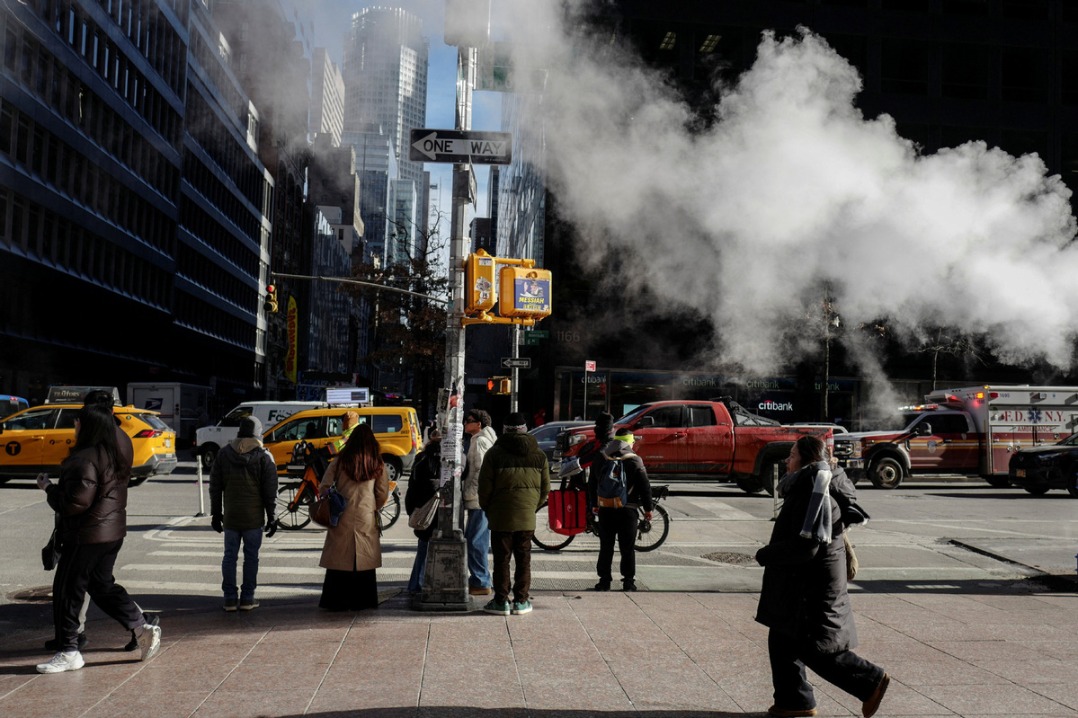US Second Amendment shapes gun debate


A recent spate of deadly mass shootings across the United States has put the spotlight on lawmakers' ability to enact meaningful gun reform and the ways in which the Second Amendment of the Constitution written in the 18th century shape today's gun laws.
The Second Amendment gives all Americans the "right … to keep and bear Arms", a view widely supported by the gun lobby and Republican politicians. However, those in favor of tighter gun control disagree with the way the law is currently being interpreted by the Supreme Court.
Carl T. Bogus, a law professor at Roger Williams University in Rhode Island, told China Daily: "Throughout American history, federal courts — including the United States Supreme Court — consistently held that the Second Amendment only pertains to guns in the militia, which today is the National Guard and part of the Armed Services. That made sense because the Second Amendment expressly refers to the militia.
"In 2008, however, the Supreme Court — in a 5-4 decision, in which the justices divided along ideological lines — reversed centuries of precedent and held for the first time that the Second Amendment grants individuals a right to keep and bear arms unconnected to militia membership."
When the Second Amendment was originally written, it was aimed at allowing people to be armed and protected from a tyrannical government. It came out of the colonies' suspicion of standing armies, after the Revolutionary War against Britain.
The Amendment was part of the Bill of Rights, which expanded upon the Constitution by establishing clear individual rights; it was added on Dec 15, 1791.
It stated that a "well-regulated militia being necessary to the security of a free state, the right of the people to keep and bear arms, shall not be infringed".
The amendment didn't focus on an individual's right to bear arms until 2008, argue some scholars.
Two cases changed the way the law was interpreted since it was ratified in 1791. The first was The District of Columbia vs Heller case in 2008. The Supreme Court then guaranteed an individual's right to keep and bear arms for lawful uses.
The second case was McDonald vs Chicago in 2010. In the case, the Supreme Court restated that through the 14th Amendment, Americans had the individual right to keep and bear arms regardless of city or state.
But after 333 mass shootings up until July 13 of this year — according to data from the Gun Violence Archive, a not-for-profit organization that collects data on gun violence online — there is renewed urgency from the public to re-examine gun control.
While at least 40 percent of American households own a gun, 55 percent of 2,550 people polled in a May 25, YouGov poll said only a "drastic change in legislation" could stop mass shootings at schools.
Bogus added: "Most Americans are disgusted by gun violence, too, but they find themselves politically incapacitated to do anything meaningful about it."
In June, Democratic President Joe Biden signed into law the first major gun legislation in more than a decade after recent mass shootings at the Robb Elementary School in Uvalde, Texas; Tops Friendly supermarket in Buffalo, New York; and at a Fourth of July parade in Highland Park, Illinois.
The law will strengthen background checks on youths buying guns and stop domestic abusers from getting guns. It will allow weapons to be taken from those deemed dangerous.
But Manuel Oliver, the father of a victim of a mass shooting in Parkland, Florida, in 2018 interrupted Biden during a White House speech on July 11, calling on him to do more.
For conservatives, the Second Amendment is deeply symbolic of their right to keep and bear arms.
Republican US Senator Ted Cruz of Texas said at this year's National Rifle Association (NRA) convention: "[Rarely] has the Second Amendment been more necessary to secure the rights of our fellow citizens."
Susan Liebell, a political science professor at Saint John's University in Philadelphia, told The Washington Post that in the 1980s, conservative presidents began appointing Supreme Court judges who would interpret the Second Amendment more broadly. President Donald Trump appointed three conservative judges to the court.
The NRA, a powerful gun-rights advocacy group, has bought political influence by donating money to the political campaigns of many congressional Republicans who oppose gun safety, according to the Brady Campaign to Prevent Gun Violence, a nonprofit organization that advocates gun control.
The top recipients of NRA donations include Senator Mitt Romney, a Utah Republican, who has received more than $13 million. Cruz received $175,000.
In 2018, retired Supreme Court justice John Paul Stevens called for the Second Amendment to be repealed in a New York Times op-ed.
Referencing the Supreme Court's 2008 District of Columbia vs Heller case, he wrote: "That decision ... has provided the N.R.A. with a propaganda weapon of immense power. Overturning that decision via a constitutional amendment to get rid of the Second Amendment would be simple and would do more to weaken the NRA's ability to stymie legislative debate and block constructive gun control legislation than any other available option."
Former Supreme Court chief justice Warren Burger, nominated in 1969 by Republican president Richard Nixon, said in a 1991 interview on the Public Broadcasting System (PBS) that the Second Amendment "has been the subject of one of the greatest pieces of fraud, I repeat the word fraud, on the American public by special interest groups that I have ever seen in my lifetime".
The US has only repealed one amendment: Prohibition. In 1933, the 21st Amendment repealed the 18th Amendment, of 1919, which prohibited making, transporting and selling alcohol.
In June, the Supreme Court struck down a century-old New York gun law that required people to obtain a license to carry a gun outside their homes or to demonstrate a "proper cause" for doing so. The ruling was the first expansion of gun rights since 2008.
Supreme Court Justice Clarence Thomas argued that the law had prevented law-abiding citizens from exercising their Second Amendment right.
In response, the New York state Legislature passed a measure that people have to pass a background check and take a gun-safety course to get a permit to own a semiautomatic rifle.
































